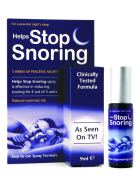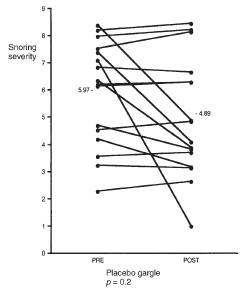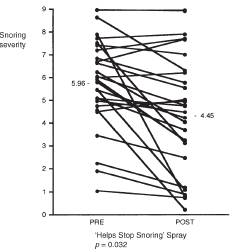David Colquhoun
Two interesting papers. One shows popular anti-oxidant ‘supplements’, beta carotene, and vitamins A and D, far from making you live longer, have the opposite effect. Another shows that garlic does not lower cholesterol. And some publicity for Dan Hurley’s book, Natural Causes. An update looks at the activities of the supplements industry spokesperson. Dr Ann Walker, who seems sometimes to forget to declare her interests.
First let’s reiterate the myth of antioxidants
Nutribollocks: the antioxidant myth
“Nutritional supplements” are one of the most profitable scams (see, for example, Healthwatch, Quackwatch, and Holfordwatch).
There is a nice article by Lisa Melton on The Antioxidant Myth: a medical fairy tale in tne New Scientist (and see here), [download as pdf] . Here are some quotations.
| Cranberry capsules. Green tea extract. Effervescent vitamin C. Pomegranate concentrate. Beta carotene pills. Selenium. Grape seed extract. High-dose vitamin E. Pine bark extract. Bee spit.You name it, if it’s an antioxidant, we’ll swallow it. According to some estimates around half of US adults take antioxidant pills daily in the belief that they promote good health and stave off disease. . . . In 1992 researchers at the US National Cancer Institute set about testing beta carotene. The trial was set to run for 6 years, but two-thirds of the way through the researchers pulled the plug after discovering, to their surprise and horror, that those taking supplements were doing worse than the controls. They had developed 28 per cent more cases of lung cancer, and their overall death rate was 17 per cent higher. It’s a similar story with the world’s most popular antioxidant. Vitamin E shot to fame in the early 1990s, after two large studies involving more than 127,000 people in total found that those with a diet high in vitamin E were significantly less likely to suffer cardiovascular disease. Use of vitamin E supplements soared. In 1990, almost nobody took vitamin E; by the end of the decade an estimated 23 million US citizens were knocking back daily doses. |
“Treatment with beta carotene, vitamin A, and vitamin E may increase mortality”
That is the conclusion of a recent paper in the Journal of the American Medical Association, “Mortality in Randomized Trials of Antioxidant Supplements for Primary and Secondary Prevention” Systematic Review and Meta-analysis”, [Get the full text].
This isn’t original research, but a meta analysis that attempts to collate existing data taking into account the reliability of each source. The aim was to analyze the effects of antioxidant supplements (beta carotene, vitamins A and E, vitamin C [ascorbic acid], and selenium) on deaths (from any cause) in adults. The analysis seems to have been done well, and the results are startling. They aren’t just a waste of money, but some of them are actually bad for you. In 47 low-bias trials with 180 938 participants, beta carotene increased death rates by 7 per cent, vitamin A by 16 per cent, and vitamin E by 4 per cent (when taken separately). Vitamin C gave contradictory results and selenium showed no detectable effect.
This work got an excellent write-up in The Times, by their health correspondent, Nigel Hawkes. This was followed by a predictably silly defence of nutribollocks by the Times’ Dr Thomas Stuttaford (known in Private Eye as Dr Utterfraud). Luckily, this was neutralised by a second piece on the same page by Nigel Hawkes, “Phooey. Sensible balanced diet is the best investment”:
“ In nutrition, a plausible idea and a little bit of evidence are all that is needed to create a market. And such is the megaphone of marketing and the influence of countless “healthy eating” articles that these ideas, even the half-baked ones, can lodge very firmly in the national psyche.”
It’s a nice coincidence that this study came out while I was reading Dan Hurley’s book, Natural Causes (see below). This book sets out dramatically the harm, sometimes serious harm, that untested “supplements” have done to some individuals. But for me the most interesting part is the revelation of the political lobbying by this $20 billion supplement industry, with the aim (largely successful) of undermining the FDA and escaping from any effective regulation of its absurd, but exceedingly profitable, claims. The supplements industry puts the Prince of Wales in the shade when it comes to subverting common sense and good science.
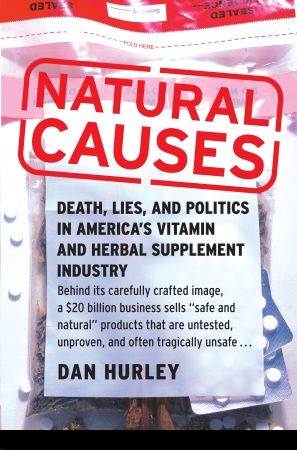
The Health Supplements Information Service (HSIS)
Needless to say, the supplements industry has already organised vilification of this excellent bit of work.
According to their web site,
“HSIS is funded by The Boots Company PLC, Bayer PLC, Perrigo, Seven Seas Ltd and Wyeth Consumer Healthcare. The campaign is co-ordinated by PAGB (Proprietary Association of Great Britain)”.
So it’s no surprise that their spokesperson. Dr Ann Walker, immediately tried to discredit the study, saying “The results of these mixed-sample metaanalyses are worthless” (The Times).
This same Ann Walker recently wrote and editorial in the British Journal of General Practice (January 2007). The editorial concludes “Although still considered to be controversial by some, taking a daily multinutrient supplement would bridge the gap between intake and requirements and ensure that nutrient target intakes are met.” But in this editorial her affiliation is given as Senior Lecturer in Human Nutrition, University of Reading. No mention at all of her role as spokesperson for the Supplements industry. Tut tut.
Patrick Holford too
Needless to say, supplement salesman Patrick Holford has weighed into the vilification. His objections have been dealt with nicely on the cutely named web site stopholfordtalkingrubbish.blogspot.com. Find the answers here.
Holford is the man who, in the BMJ said “Competing interests: none declared”, when promoting his supplements.
No interests? Holford himself has said
“any product, be it a publication, seminar, food or supplement, that is authored/invented by me has my name on it and earns me a royalty/payment. That is how I live and fund my research.”
So what about the galaxy of supplements being sold at “Health products for Life”? They say “we only supply supplements, foods and drinks that are recommended by nutrition expert, Patrick Holford.” And at the bottom of the page it says “©Copyright 2007 Holford and Associates. All Rights Reserved”. Companies House lists the sole shareholder in ‘Health Products for Life’ as P.J. Holford.
Garlic is no good either
Another interesting recent paper has appeared in Archives of Internal Medicine
Garlic is widely promoted as a cholesterol-lowering agent, but the evidence so far has been lousy. In this trial, 192 adults with low-density lipoprotein cholesterol (LDL-C) concentrations of 130 to 190 mg/dL (3.36-4.91 mmol/L) were randomly assigned to one of the following four treatment arms: raw garlic, powdered garlic supplement, aged garlic extract supplement, or placebo.
“Conclusions None of the forms of garlic used in this study, including raw garlic, when given at an approximate dose of a 4-g clove per day, 6 d/wk for 6 months, had statistically or clinically significant effects on LDL-C or other plasma lipid concentrations in adults with moderate hypercholesterolemia.”
| Last night I saw a magnificent ENO production of La Bohème at the London Coliseum. During the tear-wrenching death of Mimi in the last act, it occurred to me that if we had taken advice from homeopaths and the like, people would still be dying young from tuberculosis. | 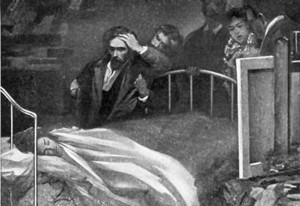 Death of Mimi |
For me, Verdi beats even Puccini with the pathos and drama of the death of Violetta from consumption in La Traviata.Listen to the last minute of La Traviata (the Joan Sutherland and Carlo Bergonzi recording): click to listen
Look at the excellent ENO ‘insideout’ web site about the production.
Opera Desire, Disease, Death (University of Nebraska Press), by Michael and Linda Hutcheon is about disease in Opera. A review of the book by Roger Burford Mason appeared in the Canadian Medical Association Journal (1996, 154, 821-823). La Traviata appeared in 1853, and at that time the cause of tuberculosis was not known.
“Generations of languishing, beautiful women were not considered dangerous or infectious, but only glamorously frail, their short lives akin to the beauty of moths fluttering around a candle flame.”
According to J. F. Murray
“Some experts advocated contagion, others a constitutional hereditary defect, atmospheric imbalances, the depredations of stress, or an inevitable consequence of the degeneration of the human race; even the role of divine retribution was occasionally evoked”
But by the time La Bohème was first performed in 1896, things were quite different. In 1882 Robert Koch had discovered the real cause of the disease, Mycobacterium tuberculosis (Koch R., Die Aetiologie der Tuberculose: Berlin klin. Wochschr. 1882;19:221-230: translation in Am. Rev. Tuberc. 1932;25:298-323). Paul Ehrlich is quoted as saying of Koch’s talk to the Berlin Physiological Society, on March 24th 1882, “This evening remains imprinted on my memory as the most awe-inspiring scientific event I have ever attended”
The Hutcheons suggested that the reason that Rodolfo abandoned Mimi was because it was known by the time of La Bohème that tuberculosis was contagious, and he didn’t want to die too. In subsequent correspondence, a letter from Mimi Divinski MD (yes, Mimi) mounted a defence of Rodolfo: “Rodolfo knows that Mimi is dying and cannot bear to watch her and feel so helpless”. “Rodolfo is a hero”. You can read that letter, and the Hutcheons’ response, here.
Homeopaths poison your mind, not your body
It is often said that homeopathy, and some other forms of quackery, though not effective, are at least harmless. This history shows otherwise. Sugar pills do not, of course, poison your body. They poison your mind. Belief in their crude and irrational delusions inhibits search for the real causes of disease and for real cures.
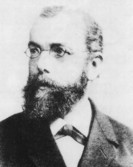 Robert Koch in 1883 Medical genius |
Like creationists, homeopathists and their ilk take the lazy approach. Don’t do the work, it’s much easier to read the holy book. If we had listened to them, people would still be dying of tuberculosis and cholera. |  Samuel Hahnemann Medical dim-wit |
This is not just historical either. At the present time, alternative medicine practitioners endanger the lives of children and adults by consistently advising against vaccination (download Schmidt & Ernst, 2003),Tuberculosis continued to kill long after Robert Koch, and long after La Bohème.
| Streptomycin was discovered in 1943, and shortly afterwards, a simple synthetic drug, isoniazid, was discovered in the labs of the pharmaceutical companies Hoffman La Roche, Farbenfabriken Bayer, and Squibb Institute for Medical Research. The first clinical trial was in 1952. And they came just in time to save my own sister who was diagnosed with tuberculosis in 1954 at the age of 14. She did not become another Violetta. Between them these drugs ended a centuries-old scourge. | 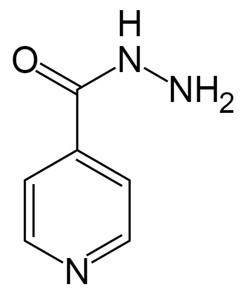 Chemical structure of isoniazid |
Another purveyor of nutribollocks who has been dissected and exposed by Ben Goldacre. His views on AIDS are a menace to humanity. And, incredibly his course has been accredited by the University of Bedfordshire (formerly known as the University of Luton).
Read full entry on the original IMPROBABLE SCIENCE page.
Using potassium dichromate to treat patients in intensive care (rather than to clean the glassware)?
No, that isn’t a joke. The respectable journal, Chest, official journal of the American College of Chest Physicians, published an article that purported to show that homeopathic potassium dichromate (i.e. water) was a useful way to treat patients in intensive care. [Frass M, Dielacher C, Linkesch M, et al. Influence of potassium dichromate on tracheal secretions in critically ill patients. Chest 2005; 27:936–941].
The title and abstract don’t mention the word ‘homeopathy’ at all. Potassium dichromate, like all hexavalent chromium compounds, is very toxic, but luckily for the patients there was no potassium dichromate present whatsoever in the treatment (it was a 30C dilution). The editor of Chest didn’t seem to think that there was anything very odd about this, but he did publish a response from me: Treating Critically Ill Patients With Sugar Pills, Chest, 131 , 645, 2007 [Get pdf ].
“It is one thing to tolerate homeopathy as a harmless 19th century eccentricity for its placebo effect in minor self-limiting conditions like colds. It is quite another to have it recommended for seriously ill patients. That is downright dangerous.”
This was accompanied by an unrepentant response from Frass.
The Frass paper has now received some close attention on the Respectful Insolence blog. Someone posting under the name ‘getzal’ has done a nice analysis which shows that the control group must have contained patients who were were more seriously ill than the homeopathically-treated group.
This week’s abusive email
For a bit of light amusement, I decided to publish the occasional bit ot email correspondence. This one arrived on 9th Feb 2007.
| From: “Stephanie Ginn”To: d.colquhoun@ucl.ac.uk Subject: homoeopathic medicine If Homoeopathic medicine doesn’t work, and it is all in the mind, how is it that if I give the wrong remedy my patients don’t get better, but when I find the right one they frequently do?This is as true of sore throats and ear infections in small children as it is to asthma and Rheumatoid Arthritis in adults. You really should do more research before shouting your mouth off over things you clearly know nothing about. We can’t all be that stupid… Stephanie |
| Dear Ms Ginn Thanks for writing. I’m always interested to hear from people like you. (though my reply will be a bit more courteous than your letter). You say “how is it that if I give the wrong remedy my patients don’t get better, but when I find the right one they frequently do? I think that you have hit the nail on the head, If you can produce the numbers to show that what you say is true, then I and everyone else I know will believe you (it would, of course, have to be done by comparison with an appropriate control group). The problem is that the homeopathic community have had 200 years to produce the evidence, and so far it has not been forthcoming.I suppose it is true to say that the evidence would have to be good in view of the inherent implausibility of homeopathy. If it turned out that it was possible to produce an effect with no molecules present, the whole of present day chemistry and physics would be overturned and since it seems to work rather well that would be surprising. Nevertheless, it is what would happen if you produced the evidence (and you’d probably get a Nobel prize too).I think though, it is your responsibility to do the research, not mine Best regards David Colquhoun |
| Thank you for your reply. Homoeopathy may sound implausible, I agree, it does if you only look at modern so called science. There are plenty of things in life which are unexplained, such as love…you can’t see it but would you deny it’s existance? I am sure and hope that you must have felt it? You are right so far in that to convince people they need proof. However, for most of us as Homoeopaths, our proof is that our patients get well, and they do, most of the time. That is generally enough proof for our patients too, especially when their brain tumours disappear. Of course there will always be some placebo effect in some people as in medicine of any sort. Perhaps you should try it for yourself and FEEL the proof…you will probably find that to be enough for you too.. Oh and by the way I think that present day physics and chemistry beliefs need overturning, desperately. Stephanie |
| Thanks for those comments. I see that you really do appreciate the need to produce evidence if you are to convince people, however convinced you may be yourself. Your most intriguing comment, though, was ” I think that present day physics and chemistry beliefs need overturning, desperately”. But it seems to me that your scepticism about the success of chemistry and physics doesn’t extend to computers, email, the web, mobile phones, motor cars and aircraft. They are all products of the application of chemistry and physics and 100 years ago they would have seemed miraculous). That leaves me wondering which bits of chemistry and physics you don’t like! Best regards David Colquhoun |
At this point, all I got back was
| Ok maybe redefining and definately [sic] rethinking are closer to the mark.Stephanie |
On Monday 5 Feb 2007, the BBC ran a piece entirled Alternative therapy put on trial. It started
“An experiment in allowing NHS patients easier access to alternative and complementary therapies has been launched by NI Secretary Peter Hain.”
| But it is NOT a trial, and NOT an experiment. Journalists seem incapable of understanding the meaning of these words, and the result is irresponsible reports (though one might detect a hint of irony in the picture that the BBC used to illustrate acupuncture; right). |
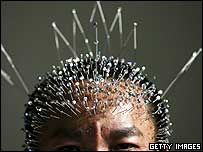 |
There is nothing new in the failure of journalists to distinguish good science from junk. We saw this very clearly in the case of the phoney fish oil “trials” going on in Durham (see Ben Goldacre’s account of these).
In the case of Durham the effect is to use public money to produce bad evidencethat can be used to promote the dubious claims of a private company, in the case “Eye Q” pills made by Equazen.
In the case of Northern Ireland, £200,000 of taxpayers’ money will be paid to a private company, GetwellUK, GPs in two areas will be able to refer patients for therapies like acupuncture, homeopathy and massage. Nothing there about seeing whether the treatments work! But Peter Hain seems to think he knows the answer already. He said
“I am certain, as a user of complementary medicine myself, that this has the potential to improve health substantially,”
He was “delighted that Northern Ireland is leading the way in integrating complementary and alternative therapies into the National Health Service”
Peter Hain used to be something of a hero to me. In the 70s his work for the Anti-apartheid movement was an inspiration (see his autobiographical notes). Now he has sunk to promoting junk science. Very sad.So what is Hain’s attitude to alternative medicine, and how did he come to ally himself with the batty medical opinions of the Prince of Wales? On his web site he had a section on this topic. For some reason it has now been deleted, but thanks (again) to Google’s cache, here is a quotation from a speech he made to The Prince of Wales Foundation for Integrated Health (12th October 2005).
|
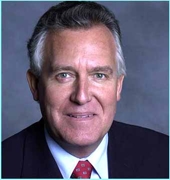 Peter Hain now 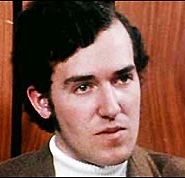 Peter Hain in 1970 |
So instead, we turned to complementary medicine. And with the help of homeopathy and tight restrictions on the sort of food that our son could eat – avoiding in particular wheat and milk products- both ailments went away.”
Hang on! You changed diet and gave homeopathic sugar pills. And that is a reason for the taxpayer to fund homeopathy? Any fool can see that this anecdote means that either (a) change in diet helped, (b) homeopathy helped, or (c) the eczema would have got better anyway. According to the National Eczema Society, “60-70% of children are virtually clear of the condition by the time they reach their mid-teens”. They “grow out” of it. Evidently a First Class Honours Degree in Economics and Political Science is not enough to teach Peter Hain what constitutes evidence and what does not.
On the other hand, the in the same speech Peter Hain also said
“I would certainly never advocate the squandering of public money on so called treatments that have no proven benefits and which take money away from existing therapies that are shown to work.”
But they have “no proven benefits”. Just how inconsistent can you get?
Who are GetwellUK?
GetwellUK is a private company financed largely by taxpayers’ money. And guess who supports it? The Prince of Quacks, once again exerting his unconstitutional influence on public policy. This is done partly through yet another of the Prince’s lobby groups, “GP Associates” (report in BMJ). It seems that “GP Associates” was the forerunner of the recently-launched “Integrated Health Associates”. The inaugural meeting of Integrated Health Associates” was sponsored by a drug company, Solgar Vitamins, a purveyor of unnecessary ‘supplements’ that is a trading arm of Boots Herbal Stores (no connection with that other well-known purveyor of misleading information, Boots the Chemists).
The Company says Support came from the government in February 2005 when the Parliamentary Under-Secretary for the Department of Health, Melanie Johnson, said in the House of Commons, “I thank the hon. Gentleman for notice of the question in relation to Get Well UK. We understand the benefit that many people get from complementary therapies. Local commissioning is a matter for local discretion, but we can see the benefits to local practices of an intermediary pulling together a range of services in the area for alternative medical treatments.” [Hansard].
“We were delighted to be selected as one of the first investees of Futurebuilders – a Treasury fund established to assist capacity building in community organisations who deliver public sector services. The investment will help Get Well UK to serve more NHS patients.”
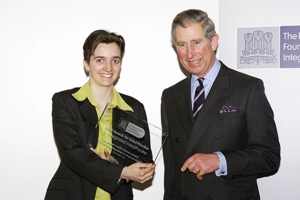
Prince of Wales with Boo Armstrong (Managing director of Getwell UK)
GetWellUK publish an evaluation of a “pilot project” in London, “Does it Work?”, by Nicola Robinson (Head of the Centre for Complementary Healthcare & Integrated Medicine,Thames Valley University).
The report tells us nothing whatsoever about the effectiveness of the treatments, because the “pilot” study was not designed to do so. It is 40 pages of waffle.
The report also says “Get Well UK is a not for profit organisation established in response to a recommendation by the House of Lords in 2000 that complementary therapies should be made available through the NHS. This is a gross misrepresentation of the House of Lords report which said this should be done ONLY if the treatments worked better than placebo. And, with very few exceptions, that still remains to be shown.
For their efforts in setting back medicine to the 19th century, they have had money from UnLtd Ventures (“provides consultancy support to a number of outstanding social entrepreneurs” and taxpayers’ money from Futurebuilders. And they are getting £200 000 of taxpayers’ money from Paul Goggins, the Northern Ireland Health Secretary
At the end of the “pilot scheme” there will have been no proper assessment of the effectiveness of the treatments. We shall be none the wiser.
BBC’s You and Yours programme (a lunchtime consumer programme) ran a good piece on “Helps Stop Snoring”, a dubious herbal “remedy” for snoring. They picked up the story from my site. Listen to the programme [mp3 file]
“Helps stop snoring” claims to work on the basis of a clinical trial. But the trial is flawed in many ways. In addition the author, Dr Andrew Prichard, seems to have quite forgotten to mention that a Helen Prichard who lives at the same address holds 2000 shares in the company that makes this wonder cure. [transferred from old improbable science page].
My pharmacological curiosity was stirred by a TV advertisement for a spray that, it was claimed, could stop you snoring. It’s hardly a life threatening condition, but it can be marriage-threatening. But what’s in it, and does it work?
A visit to the web site of Essential Health Products Limited looks promising. Their claim is this.
“CLINICAL TRIALS
Many products claim to have undergone tests, but Helps Stop Snoring is the only natural snoring remedy in the UK have undergone to a full, double blind clinical trial, conducted by a practicing Ear,Nose and Throat Consultant Surgeon.
Lasting over 18 months, the trial involved 140 snorers and their partners, and the results showed a headline success rate of 82%. The trial was conducted by Andrew Pritchard FRCS, Ear Nose and Throat Consultant at the Royal Shrewsbury Hospital and one of the UK`s leading specialists in the field of snoring and sleep disorders.
In a further first for a snore remedy the results of the trial were published in Phytology Research, an international journal, in October 2004.”
This claim was not so easy to check because the manufacturer mis-spells both the name of the author and the name of the journal. The paper in question seems to be this. Prichard AJ., The use of essential oils to prevent snoring Phytother Res. 2004 18(9), 696-9 [get the pdf].
Sadly this paper is not very convincing. The paper does describe the work as “preliminary”, but the manufacturer’s web site does not. There’s a surprise. For those who are interested, here are a few details.
|
140 adult snorers were recruited to the study via a snoring clinic. Snorers were randomly allocated to receive a metered dose of “Stop snoring “gargle, “Stop snoring ” spray or placebo gargle (there was no placebo spray at all). It isn’t obvious what placebo could mimic the peppermint, lemon, clove, thyme, eucalyptus and pine oils that the “remedy” contains (among other things). Their concentrations aren’t stated. The paper makes no mention of what was used as placebo, but Dr Prichard tells me “The content of the placebo could not be an essential oil. I have been told by the manufacturer that we used a sugar type mix”. Actually it contained water, sodium saccharin, polysorbate 20, potassium sorbate and citric acid. It would be have been obvious tor the patient whether they got the placebo or not.
|
|
The comparison that is made is before and after in each treatment group, rather than comparing the groups. The eminent statistician, Stephen Senn, has some trenchant criticisms of this sort of experimental design.
Senn points out that “Having made the mistake of using the within treatment group to baseline comparison he ought to then use the Wilcoxon signed ranks test rather than the rank sum but he doesn’t say which”. The results are pretty odd too. In the placebo group, 4 out of 11 patients show a big reduction in snoring severity (Fig. 4). In the spray group, a smaller proportion, 5 out of 28 show a big improvement (Fig 2). The changes in the rest of the patients are mostly very small, but there are more slight improvements in the spray group than in the placebo group. The percent of patients that “improve” (by any amount, however small, is therefore bigger in the spray group than control, but the difference in mean snoring severity was much smaller
Financial interests in the snoring study
Sadly, it is essential to consider vested interests in drug assessment, as I have noted below (and here, and here). Prichard’s paper states openly that it was “Sponsored by Essential Health Products Ltd, 4 Top Farm Barns, Pitchford, Shropshire, SY5 7DW, UK.” That doesn’t mean it’s wrong, though the bias associated with sponsorship is well known,
But there is no mention of shareholdings

Companies House will, only £1, sell you company reports. The records show that Helen Jane Prichard, holds 2000 shares in Essential Health Products Ltd.
Is this just a coincidence of names? I think not. If you look up. Dr Andrew Prichard in the phone book, you see that his address is exactly the same as that of Helen Jane Prichard.
Oh dear: looks like yet another undisclosed financial interest in a clinical study.
Many thanks to the inimitable Ben Goldacre fot the totally over-the-top link to this item: it has done wonders for my hit rate.
Boots the Chemists is selling the same stuff True to their philosophy of making money and never mind the evidence, the “Boots Alternatives” range of snake oil products has, for £14.99, exactly the same stuff. They claim the Boots |
 |
Enquiries to Boots about this product have not been answered or have been answered inaccurately. See also below for Boots miseducation pages.
And here’s the ironical bit. Boots web site makes a big point about CSR (Corporate Social Responsibility). (Thanks to Sean
Kehoe for spotting this.)
“TRUST BOOTS
As you may have noticed, that’s the tagline which in 2005 we adopted as the sign-off to all our advertising. But it’s much more than just a slogan. It’s a concise statement of our entire corporate strategy. Our aim is to make Boots the world’s best health and beauty retailer, and we’re 100% clear that the unique trust in which we are held provides the key to achieving this. Which means, of course, that those two words are also the rationale for all our CSR activities. Everything we do that builds trust is good for our business; anything which could compromise it, a risk we can’t afford to take.”
Trust Boots to provide straight answers.
They must be joking.
BBC’s Panorama programme broadcast the content of secret emails. They show that GSK was aware of evidence the Seroxat increased risk of suicide in young patients, and suppressed it. They also showed that Prof Martin Keller’s paper on the topic was ghost-written by a PR firm working for GSK.
Moved to this blog from the old IMPROBABLE SCIENCE page: see Universities Inc
Misleading advertising of magnets. Office of Fair Trading acts
A major problem in stopping CAM fraud is the generally toothless attitude of the Advertising Standards Authority and of the Office of Fair Trading. Not this time though. The OFT Press Release reads thus.
“The OFT is seeking an injunction preventing publication of advertisements making the following claims about the company’s products:
- the products have a therapeutic effect, caused by a specified physiological mechanism, due to the magnets they contain
- the therapeutic effect of the products, due to the magnets they contain, is clinically proven or established by scientific trials, or is widely accepted in the scientific or medical communities
- unqualified claims the products have a therapeutic effect and/or that wearing products containing magnets will always produce such an effect, due to their magnets
- that products magnetise or ionise water as a result of the magnets they contain.
Magno-Pulse Limited contends that the advertisements are not misleading and has refused to stop publishing adverts making these kinds of claims. Accordingly, the OFT has issued proceedings so the courts can decide the matter. Magno-Pulse Limited has indicated it intends to defend the proceedings.
Christine Wade, Director of Consumer Regulation Enforcement said:
“Where advertisements claim products have therapeutic effects it is important they do not mislead consumers. The OFT is asking the High Court to decide if Magno-Pulse Limited?s advertisements are misleading.”
It cannot have escaped the attention of the PPA (above) that this action makes them look pretty foolish.
Let’s hope the High Court is not fooled.
Magnets: ruling against false advertising
The amazing decision of the Prescription Pricing Authority to allow the NHS to pay for magnetic bandages has been covered in detail here (part 1, part 2, part 3), as has the extreme reluctance of the PPA and the Department of Health to give any useful information (here, and here). More on this topic elsewhere. Eventually the decision was referred to the Office of Fair Trading has delivered its judgement. MagnoPulse Limited was told to remove most of its absurd claims from its advertising.
It remains to be seen whether the PPA admit their mistake and reverse their decision.
Les Rose debates with homeopath Katherine Armitage on the Vanessa Feltz show on BBC Radio London. Listen to the clip to hear some of the best pseudo-scientific gobbeldygook on record.
Read full entry on the original IMPROBABLE SCIENCE page.
In the course of a long correspondence with the MHRA about their endorsement of a dishonest label for a herbal preparation, arnica gel, I eventually got an admission from them that the stuff doesn’t work.
For earlier episodes in this saga, see part 1, part 2, part 3 and part 4.
| “As you have clearly identified the Directive is far from perfect. The vast majority of herbal products currently on the UK market without claims are of unproven benefit.” Dr Linda Anderson, B.Pharm., PhD, Pharmaceutical assessor at the MHRA. |
Which herbal medicines have been assessed by the Regulator?
|
“Both these kinds of medicines are regulated by the MHRA and meet assured standards.” would, by most people, be interpreted to mean that the MHRA was providing some sort of asssurance that the stuff worked. It doesn’t. This wording is, to my mind, misleading and disgraceful.
One of the zaniest bit of quantum bollocks of all time. Sigh,.
Read full entry on the original IMPROBABLE SCIENCE page.
The Medicines and Healthcare products Regulatory Agency (MHRA) is an executive agency of the Department of Health). It is roughly the UK equivalent of the Food and Drugs Administration (FDA) in the USA.
The MHRA has just betrayed the trust placed in it by the public by allowing untrue claims to be put on the labels of homeopathis and herbal treatments, apparently under pressure from the government and the Prince of Wales, as described below, and here. The cause such outrage that the MHRA was censured by an annulment debate in the House of Lords, It also caused condemnations to be issued by the many learned societies, most of which you can read at the links here. For example, Royal Society, the Medical Research Council, the Academy of Medical Sciences, the Royal College of Pathologists, the Biosciences Federation (which represents 40 affiliated societies), the Physiological Society and the British Pharmacological Society.
In contrast, the main medical organisations have kept disgracefully silent. Nothing has been heard from the British Medical Association (I hear that a move to say something was heavily defeated). Nothing either from the Royal College of General Practitioners or from the Royal Society of Medicine.
The Physiological Society ‘s Newsletter for December 2006 published and excellent leading article ‘Homeopathic mumbo-jumbo], by Austin Elliott [read it here].
| The Physiological Society“The Physiological Society is concerned with the scientific investigation of how the body works “It is our view that “alternative medicine” has, with very few exceptions, no scientific foundation, either empirical or theoretical. As an extreme example, many homeopathic medicines contain no molecules of their ingredient, so they can have no effect (beyond that of a placebo). To claim otherwise it would be necessary to abandon the entire molecular basis of chemistry. The Society believes that any claim made for a medicine must be based on evidence, and that it is a duty of the regulatory authorities to ensure that this is done.” |
Austin Elliott comments thus.
 “And as the web site of the European Council for Classical Homeopathy (6) puts it: ˜To make such a claim, the manufacturers need only show that the product has been used to treat those particular conditions within the homeopathic industry. No scientific basis. No clinical trials. No evidence of effectiveness. The homeopaths, and the companies that produce over-the-counter homeopathic remedies, are understandably delighted. Well, you might say, so what? The placebo effect is not new, and a fool and his/her money are soon parted. Most scientists would agree that the labelling is a joke, but in a world awash with ridiculous claims, why get worked up? Well, firstly, perhaps, because the MHRA, acting on our behalf, is supposed to care -their web site states they ‘enhance and safeguard the health of the public by ensuring that medicines and medical devices work, and are acceptably safe’. Secondly, . . . there is a principle at stake, namely that decisions of this kind should b made on the basis of scientific and medical evidence and understanding.” |
A debate was held at the Natural History Museum on “Does Homeopathy Work?â€. You can see it on streaming video. Peter Fisher gave a talk which, after shameless cherry-picking of the evidence, went on to explain that if a memory stick can hold a lot of information, so can water (I’m not kidding).
Read full entry on the original IMPROBABLE SCIENCE page.
The BBC2 Newsnight programme, in an excellent bit of investigative journalism, has shown that an ex-arms dealer, Michael Hart Jones has conned the Swaziland government with his claims to cure AIDS with a useless and probably dangerous treatment for AIDS based on goat serum.
Read full entry on the original IMPROBABLE SCIENCE page.

